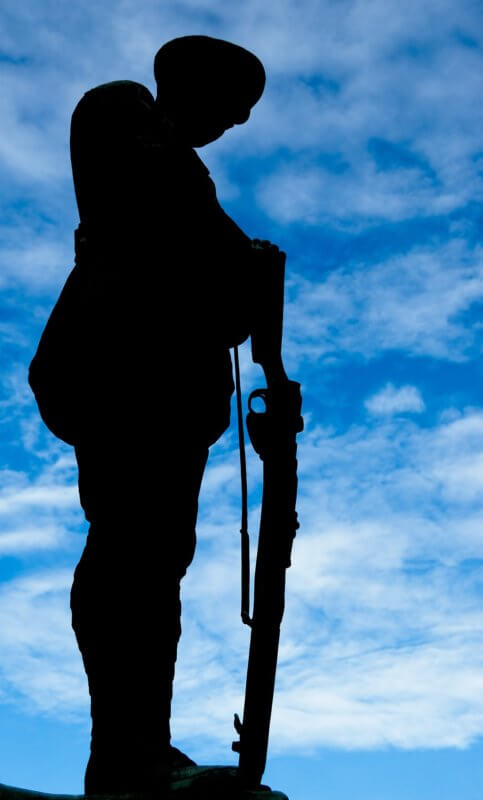More effective ways to heal war’s unseen wounds
Nov. 11 is a federal holiday with powerful significance.
Like Memorial Day in May, it recognizes and honors those who have served in the U.S. military during times of armed conflict and war. Memorial Day focuses on those who died in combat, while Veterans Day focuses on those who served in combat zones and survived to come home.

Veterans Day originated in the celebration of the signing of the World War I ceasefire or armistice on Nov. 11, 1918 in that “war to end all wars.” In several European countries, Nov. 11 is still commemorated as Armistice Day. President Woodrow Wilson recognized it here in 1919, saying: “To us in America, the reflections of Armistice Day will be filled with solemn pride in the heroism of those who died in the country’s service and with gratitude for the victory, both because of the thing from which it has freed us and because of the opportunity it has given America to show her sympathy with peace and justice in the councils of the nations.”
From a solemn acknowledgment of the horrors of war and a commitment to work for peace, that day has drifted somewhat from its original intent. World War I was not, in fact, “the war to end all wars” and the U.S. continues to engage in overseas military conflict on a disturbingly regular basis. After being designated a federal holiday by Congress in 1938, the name was changed to Veterans Day in 1954 to honor the veterans of all U.S. military conflicts. After Congress shifted the date between October and November for several years in an effort to create three-day holiday weekends for workers, President Gerald Ford returned Veterans Day to Nov. 11 in 1975 to recapture at least some of the original intention of committing to and celebrating peace as a universal principle.
Today, some typical Veterans Day activities do hearken back to the original intent, like the wearing of red paper poppies to symbolize the determination for life to regrow after the ravages of war. Community parades and commemorations typically focus on patriotism, military pride and appreciation of the service and sacrifice of military personnel and their families.
But occasionally, there will be a contingent from Veterans for Peace, whose symbol is the white dove of peace and whose discussion points throughout the year include an honest look at the true costs of war. A wreath will be placed on the Tomb of the Unknown Soldier in Arlington National Cemetery and flags flown at half-mast. Communities and individuals often observe two minutes of silence at 11 a.m., the hour the 1918 armistice was signed.
Charlotte does not hold a special Veterans Day event, although churches, some community groups and families create their own ways to remember. Shelburne welcomes participants from the area to a public remembrance at the Veterans Memorial on the parade ground, starting at 11 a.m. on Nov. 11.
A less familiar opportunity is through the national group, Vets Town Hall. They offer a unique way to acknowledge the personal significance (both positive and negative) that military service carries and especially the impact that combat has on a person. Some war wounds are clearly visible, and some are not. Many are poorly understood by either the veteran or those in a position to help. But we know combat is traumatizing in complicated ways and can make adjusting to life back home extremely difficult.
Vets Town Hall is a model for organizing local public events which provide a safe opportunity for veterans to speak honestly about what their military service meant in their lives. Veteran and non-veteran audience members listen without comment. It is a powerful way to promote understanding of a veteran’s experience and how it has influenced their life. Being part of the audience to hear these stories is a uniquely supportive way to show your care and appreciation for fellow Americans who went to war on our country’s behalf.
The final Vermont Vets Town Hall this fall will be held Nov. 6 in Colchester at the McCarthy Arts Center of St. Michael’s College at 1 p.m. Veterans of any era who served in any active-duty capacity during military conflict are invited to speak for up to 10 minutes about that experience and its impact on them. Non-veterans are especially encouraged to attend and listen. This facilitated event is non-political and non-judgmental. There will be no debate on American foreign policy. We will simply listen and learn. You are encouraged to register in advance at vtvetstownhall.org to speak or attend.
Veterans are all somebody’s friends, neighbors, family members — fellow Americans whose military service sent them into war. Yes, they survived and came home. But who could go through war without being changed, and without wounds that need time and help to heal?
Despite the U.S. Veterans Administration providing government-funded services, the current suicide rate for veterans is 1.5 times higher than that of the general population, and the rate among female veterans is 2.5 times higher than that of non-veteran women.
Don’t we owe our veterans not only appreciation but all the support we can give to help them move forward with their civilian lives? Whether we know individual veterans or not, we are their grateful community, and our job seems clear: Both to work for peace and non-violent resolution of conflict and to listen to and honor their stories.
Only then perhaps we as a country can find more effective ways to help heal the wounds that war inflicts.
(Linda Hamilton is a member of Charlotte Grange and associate member of the Will Miller Green Mountain Chapter of Vermont Veterans for Peace.)

